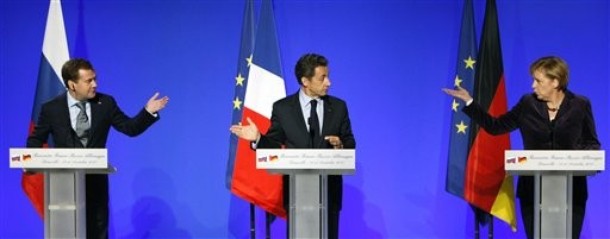
From the Economist: Its sharp-elbowed behaviour during the near-collapse of the euro earlier this year heightened concerns about Germany’s role in the world that have been stirring ever since unification 20 years ago. Speeches, seminars and scholarly articles by nervous Germans and Germany-watchers are a booming cottage industry. A recent essay published by Bruegel, a Brussels think-tank, explains “why Germany fell out of love with Europe”. Another, from the European Council on Foreign Relations, alleges that Germany is “going global alone”. Jürgen Habermas, Germany’s most distinguished living philosopher, accuses his country of pursuing an “inward-looking national policy”. “How can you not ask Germany questions about its vision of the future of Europe?” wonders Jacques Delors, who was president of the European Commission when the Berlin Wall fell. Even a pacific and prosperous Germany causes international angst. …
The German question never dies. Instead, like a flu virus, it mutates. On the eve of unification some European leaders worried that it would resume killer form. “We’ve beaten the Germans twice and now they’re back,” said Margaret Thatcher, Britain’s prime minister. Such fears now look comical. But even today’s mild strain causes aches and pains, which afflict different regions in different ways. America’s symptoms are mild. Central Europe seems to have acquired immunity. After unification 85% of Poles looked upon Germany as a threat, recalls Eugeniusz Smolar of the Centre for International Relations in Warsaw. Now just a fifth do. It is among Germany’s long-standing west and south European partners that the German question feels debilitating, and where a dangerous flare-up still seems a possibility. Germany’s answer to the question matters not only to them. It will shape Europe, and therefore the world. …
The crisis has created a new pecking order, at least temporarily. Germany, with its high-competitiveness, low-debt economy, is on top. The rest are having to adjust, including France, traditionally a joint leader of the European project. This is unsettling. “You get an enormous sense of German self-righteousness, which is very difficult to take, especially when there are solid foundations for it,” says François Heisbourg of the International Institute for Strategic Studies. France, which has lagged behind Germany in making structural reforms, feels its influence waning. “France has to do its homework to be able to restore some level of influence in Europe,” says Jean-Pierre Jouyet, a former French minister for Europe, now head of France’s financial regulatory authority. …
[I]n military terms, Germany remains a midget compared not just with America but with Britain and France, which together account for 70% of the EU’s military research and development and 60% of its deployable forces. “What’s missing is Germany leading rather than seeing what Paris and London cook up,” says a NATO diplomat. Its military deployments in Afghanistan and elsewhere are recent and unpopular. Its body of strategic thinkers is small. Germany’s trading relationships bring influence, but also inhibit its willingness to join allies to fight global threats. (photo: AP)
Image: ap%2010%2026%2010%20merkel%20medvedev%20sarkozy.jpg
